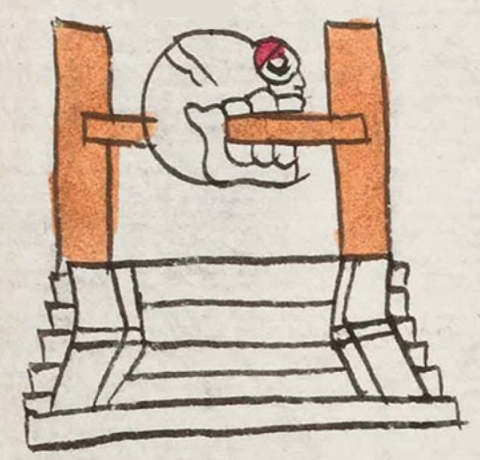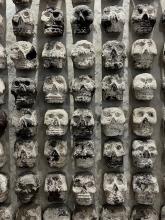tzompantli (Mdz35r)
This logogram of a skull rack (tzompantli) has been carved from the compound glyph for Tzompahuacan. The wooden rack (colored terracotta) consists of two upright pieces of wood and one crossbar (also brown, apparently wood). While known racks often had multiple skulls, this element shows one skull, sufficient to identify the concept. The bar that holds the skull goes into the back of the skull and oomes out again through its teeth. The skull is white, outlined in black. The eye is white, drawn with black lines, but it has a red eyelid.
Stephanie Wood
The bottom of the compound glyph for Tzompahuacan has the base of a white, stepped temple (teopan) underneath the skull rack, which remains to be analyzed, possibly representing the -hua- (possession or containment?). The look of this eye, different from that in skulls association with other tzompantli from the Codex Mendoza, recalls the sign for ixtli. Perhaps the artists for the tzompantli on folios 2 recto and 17 verso vs. this one were different. Recent news from the Templo Mayor in Mexico City reveals the discovery of additional buried skulls for that site.
Stephanie Wood
c. 1541, or by 1553 at the latest
Stephanie Wood
Joseph Scott and Crystal Boulton-Scott made the SVG.
skulls, racks, tzompan
Tzompantli. Section of a stone version located in the Museo del Templo Mayor. Photograph by Robert Haskett, 15 February 2023.

tzompan(tli), skull rack, https://nahuatl.wired-humanities.org/content/tzompantli
skull rack
el plataforma de calaveras, un palo con cabezas de personas sacrificadas
Stephanie Wood
Codex Mendoza folio 35 recto, https://digital.bodleian.ox.ac.uk/objects/2fea788e-2aa2-4f08-b6d9-648c00..., image 80 of 188.
The Bodleian Libraries, University of Oxford, hold the original manuscript, the MS. Arch. Selden. A. 1. This image is published here under the UK Creative Commons, “Attribution-NonCommercial-ShareAlike 3.0 License” (CC-BY-NC-SA 3.0).








